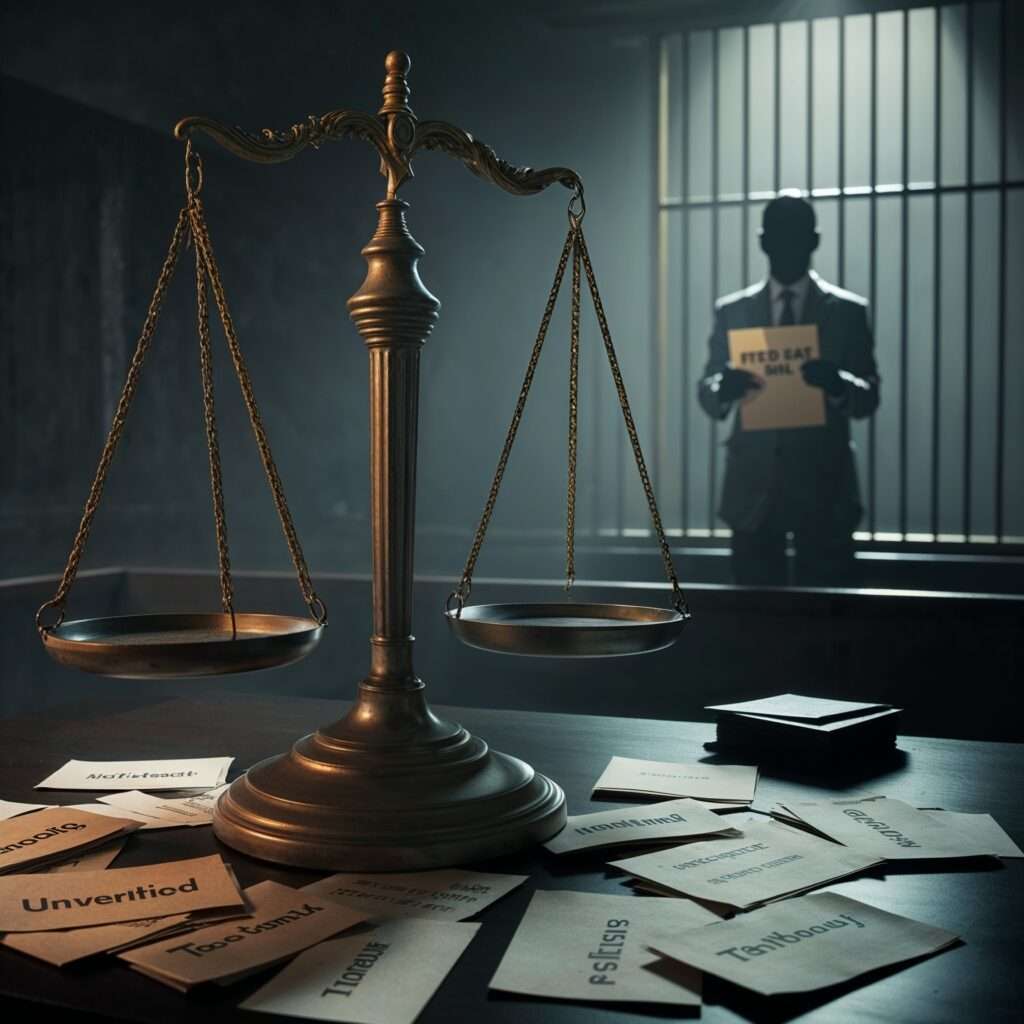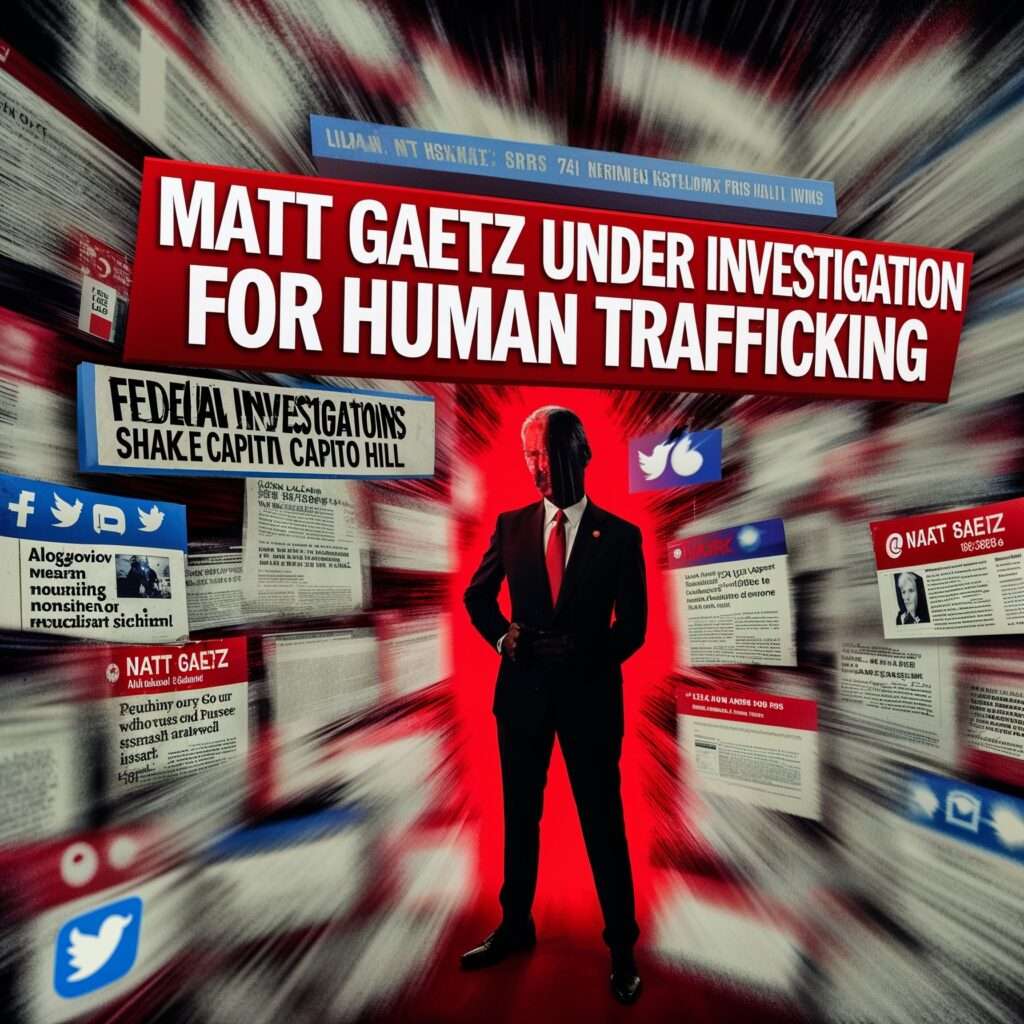
"Media narratives can blur the line between truth and perception. The Matt Gaetz human trafficking allegations exemplify the chaos between fact and speculation."
Introduction: Gaetz in the Crosshairs
In American politics, few figures are as polarizing—or as frequently targeted—as Florida Congressman Matt Gaetz. Known for his staunch conservatism, unapologetic style, and unwavering loyalty to former President Donald Trump, Gaetz is both a hero to his supporters and a prime target for his critics. Among the controversies surrounding him, none loom larger than the Matt Gaetz human trafficking allegations.
Over several years, the Department of Justice (DOJ) conducted investigations while an unrelenting media campaign painted Gaetz in a negative light. Yet, no charges were filed. Despite this legal outcome, the allegations persist, continuing to undermine his credibility and influence. This situation raises vital questions about how media narratives intersect with legal systems and public perception.
“The absence of evidence hasn’t stopped the presence of accusations.”
This saga prompts reflection on critical issues:
- Why have these allegations persisted despite the lack of substantive proof?
- Who benefits from tarnishing Gaetz’s reputation, and for what purpose?
- What does this case reveal about declining trust in media and legal institutions?
The Matt Gaetz human trafficking allegations are more than a scandal. They provide a lens through which we can analyze the manipulation of public trust and the fragility of reputations in the digital age.
Tracing the Matt Gaetz Human Trafficking Allegations
Joel Greenberg’s Role in the Matt Gaetz Human Trafficking Allegations
The allegations against Gaetz originated with Joel Greenberg, a former Seminole County tax collector whose criminal activities implicated him in a wide range of federal offenses. Greenberg, convicted of sex trafficking a minor and other crimes, became the centerpiece of the DOJ’s investigation into Gaetz. As part of a plea deal, Greenberg testified that Gaetz had engaged in similar activities, including paying for sex with an underage girl and facilitating her travel across state lines.
However, Greenberg’s claims lacked credibility due to his extensive criminal history and repeated dishonesty. His accusations against Gaetz were unverified, relying on hearsay and vague details rather than concrete evidence. Despite dedicating significant resources to the investigation, federal prosecutors concluded that Greenberg’s testimony was insufficient to support any charges against Gaetz.
“When allegations hinge on a single, unreliable witness, cracks in the narrative are inevitable.”
The DOJ’s reliance on Greenberg’s testimony raises larger concerns about how such cases are constructed. Without verifiable evidence, allegations risk devolving into political leverage, allowing individuals like Greenberg to manipulate public perceptions and tarnish reputations unjustly.

Key Claims in the Matt Gaetz Human Trafficking Allegations
The Matt Gaetz human trafficking allegations rested on two main claims that dominated public discourse but ultimately fell apart under scrutiny:
Unsubstantiated Allegations of Underage Relationships
Reports accused Gaetz of paying for sexual encounters with women, including a 17-year-old girl, and arranging her interstate travel. If proven, these actions could constitute sex trafficking under federal law.
However, the investigation revealed no concrete evidence connecting Gaetz to any underage individuals or criminal acts. The alleged victim declined to cooperate with investigators, further weakening the case. Critics highlight that the absence of physical evidence or verified testimony underscores the fragility of the allegations.
Media Speculation About Matt Gaetz and Human Trafficking
Numerous reports heavily relied on unnamed sources and leaked information to amplify the claims. Sensational headlines, such as “Matt Gaetz Faces Federal Sex Trafficking Investigation,” dominated the media, shaping public perception long before any legal conclusions were drawn.
In addition, media outlets sensationalized Gaetz’s alleged involvement in a broader scheme with Joel Greenberg, describing ostentatious lifestyles and wild parties. While these details captivated audiences, they often lacked verifiable evidence. The heavy reliance on speculation over substance has drawn sharp criticism of journalistic practices in this case.
Absence of Credible Evidence in Matt Gaetz Trafficking Allegations
Ultimately, both claims collapsed under scrutiny. Federal prosecutors found Greenberg’s testimony unreliable and unsubstantiated. Meanwhile, the media’s portrayal of Gaetz as guilty in the court of public opinion continues to face criticism for perpetuating baseless narratives.
“When the media echoes allegations without evidence, it becomes both prosecutor and jury in the eyes of the public.”
What Went Wrong in the Matt Gaetz Human Trafficking Case
The Matt Gaetz human trafficking allegations unraveled as significant weaknesses emerged in the case. Two key factors contributed to its collapse:
Greenberg’s Credibility Issues in the Gaetz Trafficking Allegations
Joel Greenberg, a central figure in the investigation, had an extensive criminal history that severely undermined his reliability as a witness. Convicted of fraud, embezzlement, and sex trafficking, Greenberg cooperated with investigators as part of a plea deal aimed at reducing his sentence. His testimony against Gaetz relied heavily on vague and unverified claims, which lacked independent corroboration.
“When the foundation of an accusation is unstable, the entire narrative begins to crumble.”
Greenberg’s motivations also came under scrutiny. By implicating Gaetz, he sought leniency for his own crimes, casting doubt on his credibility. This dynamic created an inherent conflict of interest, further eroding the strength of his allegations.
The Lack of Evidence in the Matt Gaetz Human Trafficking Investigation
Despite years of investigation, federal prosecutors could not produce direct evidence linking Gaetz to the alleged crimes. Key elements—such as proof of payments, verified communications, or testimony from alleged victims—were conspicuously absent. Investigators reportedly struggled to find any independent verification of Greenberg’s claims.
In early 2023, the Department of Justice declined to press charges, citing the lack of evidence and the unreliability of witnesses. This outcome illustrates how legally unfounded allegations can still inflict significant reputational damage through prolonged public scrutiny.
How the Media Amplified the Matt Gaetz Human Trafficking Allegations
“In today’s media landscape, the line between news and narrative is often a blur.”
While the legal case against Gaetz faltered, the media played a pivotal role in shaping public perception. Coverage of the Matt Gaetz human trafficking allegations often mixed sensationalism with speculative narratives, presenting unverified claims as established truths. This approach turned the allegations into an enduring scandal, regardless of their legal merit.
Anonymous Sources Fueled the Gaetz Trafficking Allegations
Many reports leaned on unnamed insiders or leaked FBI details, giving the allegations an air of credibility while obscuring the origins of the claims.
- Example: Articles frequently cited “sources familiar with the investigation,” leaving readers unable to evaluate the reliability of the information.
- Impact: This reliance on anonymity created a feedback loop where speculation was treated as fact, reinforcing narratives without solid evidence.
Sensational Headlines and the Matt Gaetz Human Trafficking Allegations
Bold, click-driven headlines dominated the media, framing Gaetz as guilty long before any legal determinations were made.
- Example: Titles like “Matt Gaetz Under Investigation for Human Trafficking” captured public attention but blurred the distinction between investigation and conviction.
- Result: Even after prosecutors declined to press charges, the damage to Gaetz’s reputation persisted due to the lasting impression created by these headlines.

Cultural Amplification of the Gaetz Human Trafficking Narrative
The allegations transcended traditional news outlets, gaining traction on social media, late-night comedy shows, and among online influencers. This cultural amplification embedded the scandal deeply into public consciousness, often oversimplifying the complex realities of the case.
- Social Media: Platforms like Twitter and TikTok saw viral posts accusing Gaetz of guilt, often ignoring updates or factual nuance.
- Entertainment Media: Late-night hosts mocked Gaetz regularly, solidifying his portrayal as guilty in the court of public opinion.
- Echo Chambers: Partisan echo chambers amplified the allegations, turning them into a talking point even for those unaware of the legal developments.
“When allegations become memes, reputations are lost in the noise.”
The Broader Implication
The media’s handling of the Matt Gaetz human trafficking allegations reveals a disturbing trend: narratives now wield more power than facts. By amplifying unverified claims and framing investigations as proof of guilt, the media contributed to a lasting stigma that continues to overshadow the absence of legal accountability.
Examples Of Media Assault on Gaetz
| Publication | Title | Date | Link |
|---|---|---|---|
| The New York Times | “Matt Gaetz Is Said to Face Justice Dept. Inquiry Over Cash Paid to Women” | March 30, 2021 | Read Here |
| The Washington Post | “Matt Gaetz Is Investigated Over Possible Sex Trafficking” | March 30, 2021 | Read Here |
| CNN | “Gaetz Investigation Involves Possible Sex Trafficking of Minor, Sources Say” | March 31, 2021 | Read Here |
| NBC News | “Matt Gaetz Faces Federal Sex Trafficking Investigation” | March 30, 2021 | Read Here |
| Vox | “Matt Gaetz’s Scandal and Legal Problems, Explained” | April 2, 2021 | Read Here |
| Politico | “Gaetz Investigation Complicates GOP’s 2022 Prospects” | April 1, 2021 | Read Here |
| The Guardian | “Matt Gaetz Faces Justice Department Inquiry Over Sex With Underage Girl” | March 31, 2021 | Read Here |
| ABC News | “Rep. Matt Gaetz Under Investigation for Alleged Sexual Misconduct” | March 31, 2021 | Read Here |
| CBS News | “Rep. Matt Gaetz Denies Relationship With 17-Year-Old Amid Federal Investigation” | March 31, 2021 | Read Here |
| USA Today | “Rep. Matt Gaetz Under Investigation for Alleged Sexual Relationship With Minor” | March 31, 2021 | Read Here |
Legal Reality vs. Public Perception of the Matt Gaetz Allegations
In the justice system, allegations require evidence to result in charges. In the court of public opinion, however, accusations alone are often enough to destroy reputations. The Matt Gaetz human trafficking allegations perfectly illustrate this troubling dichotomy.
“When the scales of justice clash with the weight of public opinion, truth becomes collateral damage.”
Despite a DOJ investigation that ended without charges, the perception of Gaetz’s guilt persists. Media narratives amplified this perception, leaving a lasting mark. Gaetz’s experience is not unique; it reflects a larger pattern where prominent figures are judged and condemned in the public eye before any legal process concludes.
Why Public Perception of Gaetz Differs From Legal Reality
- Media Influence: Sensational headlines cast the allegations in a damning light, fostering a lasting association of guilt even in the absence of legal action.
- Confirmation Bias: Those predisposed to dislike Gaetz, whether due to his politics or personality, found the allegations credible, reinforcing their preconceptions.
- Delayed Legal Clarity: The prolonged investigation allowed speculation to flourish, with many interpreting the absence of charges as evidence of political interference rather than a lack of proof.
Implications for Trust in Institutions After the Gaetz Allegations
This case underscores a growing erosion of faith in both media and judicial systems. When narratives overshadow facts, public confidence in institutions weakens. Gaetz’s ordeal highlights the dangers of conflating an investigation with guilt, making it a cautionary tale for the broader public.
Why Matt Gaetz’s Exit Doesn’t Prove Human Trafficking Guilt
In 2024, Matt Gaetz announced he would not seek reelection. Critics quickly framed this decision as an admission of guilt regarding the Matt Gaetz human trafficking allegations. However, this interpretation ignores other plausible explanations rooted in strategy and recalibration.
Political Fatigue and the Gaetz Human Trafficking Allegations
Years of intense scrutiny and relentless attacks take a toll, even on resilient politicians. Gaetz’s decision to step away may reflect a desire to focus on personal pursuits or simply escape the constant pressures of public office.
- Key Insight: High-profile figures often leave politics to regain control over their lives, not because of guilt.
Strategic Career Shifts in the Wake of Gaetz Allegations
Public office, while influential, is not the only platform for wielding power. Gaetz may be positioning himself for new opportunities in media, advocacy, or private legal practice. These fields allow for significant influence without the constraints of partisan politics.
- Example: Figures like Newt Gingrich transitioned from politics to media, using their platforms to remain influential.
Structural Barriers to Federal Appointments
Federal appointments, often lucrative and prestigious, require Senate confirmation—a challenging process for sitting politicians. By leaving Congress, Gaetz may simplify his path to such roles, positioning himself as a stronger candidate for future opportunities.
“In the labyrinth of public perception, leaving the stage doesn’t always mean retreat—it can mean recalibration.”
Gaetz’s decision reflects a calculated move rather than an admission of wrongdoing, illustrating how politicians navigate complex systems to achieve long-term goals.
The Slander Machine: Who Benefits From the Gaetz Allegations?
If the Matt Gaetz human trafficking allegations are unsubstantiated, why do they persist? To answer this, it’s crucial to consider the entities that benefit from his tarnished reputation.
Political Rivals and the Gaetz Human Trafficking Allegations
Matt Gaetz’s unapologetic style and unwavering loyalty to Donald Trump have made him one of the most divisive figures in Congress. His bold rhetoric and willingness to challenge both Democratic and Republican leadership put him in direct opposition to key power brokers on both sides of the aisle. For his political adversaries, the Matt Gaetz human trafficking allegations provided a convenient means to sideline an outspoken critic without directly engaging with his policy positions or political influence.
Why Rivals Benefit
- Distraction: Allegations of this magnitude divert attention from Gaetz’s legislative priorities, such as defense appropriations, judicial reform, and reducing government spending. Instead of debating his policies, his opponents can focus public attention on his personal reputation.
- Erosion of Alliances: Scandals undermine the confidence of political allies, isolating Gaetz within his party and weakening his ability to mobilize support for key initiatives.
Impact on Gaetz’s Policy Influence
Gaetz has been a staunch advocate for limiting government overreach, challenging the military-industrial complex, and scrutinizing judicial processes. Allegations of misconduct distract from these efforts, allowing his critics to discredit him without confronting his positions directly. Rivals also use these allegations as leverage to reshape public narratives, framing Gaetz as a liability to his political allies.
“Neutralizing Gaetz through scandal has proven more effective than opposing his policies outright.”
Media Profits From the Matt Gaetz Human Trafficking Allegations
The Matt Gaetz human trafficking allegations provided an irresistible opportunity for media outlets to capitalize on a high-profile controversy. Stories involving prominent figures accused of heinous crimes reliably attract attention, creating a perfect storm for engagement in an increasingly competitive media landscape.
The Profitability of Scandal
- Click-Driven Revenue: Headlines like “Matt Gaetz Under Investigation for Human Trafficking” generate higher engagement rates than routine political coverage. Scandals offer a combination of drama, controversy, and moral outrage, all of which are proven to drive clicks and boost ad revenue.
- Sustained Interest: The protracted nature of investigations allows media outlets to release incremental updates, maintaining public interest over time. Each new development—however minor—is framed as breaking news, feeding the cycle of attention.
Key Metrics
- Studies show that articles involving scandal or crime receive up to 40% more engagement than routine political reporting.
- Media outlets see higher ad conversion rates on articles covering sensational controversies compared to those on policy issues or legislative debates.
Media’s Role in Shaping Perception
Beyond revenue, media outlets wield tremendous influence over public perception. By framing allegations as near-certainties, they shape how audiences interpret events before legal outcomes are established. This contributes to a lasting stigma, even if no charges are ultimately filed.
“In a crowded media landscape, scandal isn’t just news—it’s a business model.”
Institutional Distrust Fueled by the Gaetz Trafficking Case
The handling of the Matt Gaetz human trafficking allegations by law enforcement agencies further deepened public distrust in institutions like the Department of Justice (DOJ) and the FBI. The slow drip of leaked information, vague public statements, and prolonged investigations created an atmosphere of suspicion that undermines the integrity of these organizations.
The Problem with Leaks
- Erosion of Fair Process: Leaks to the media often bypass due process, allowing unverified claims to shape public perception before formal conclusions are reached.
- Perceived Partisanship: The DOJ and FBI already face criticism for their handling of politically sensitive cases. In Gaetz’s case, the protracted investigation, combined with selective leaks, fueled accusations of bias and incompetence.
Parallel Examples
- Hillary Clinton’s Email Investigation: The constant flow of information about the Clinton email case damaged her reputation, despite no criminal charges being filed.
- Brett Kavanaugh’s Confirmation Hearings: Leaks and unsubstantiated claims became a flashpoint, polarizing public opinion and overshadowing the formal judicial process.
Impact on Public Trust
These patterns contribute to a broader erosion of faith in institutions. When agencies appear politicized or incapable of resolving cases efficiently, it undermines their ability to function as neutral arbiters of justice. The Matt Gaetz human trafficking allegations became another chapter in the story of declining trust in American institutions.
“When justice is perceived as partisan, it ceases to inspire confidence—it becomes another battleground.”
Broader Implications
The persistence of these allegations highlights the fragility of reputations in an era where perception often outweighs facts. For Gaetz, this isn’t just about legal vindication—it’s about reclaiming control over a narrative that has spiraled beyond his influence.

Concluding Reflections on the Matt Gaetz Human Trafficking Allegations
The Matt Gaetz human trafficking allegations are more than just another political controversy—they serve as a stark reminder of how fragile truth has become in an era dominated by media sensationalism and institutional dysfunction. When the line between fact and fiction blurs, perception often takes precedence over reality, leading to profound consequences for individuals, institutions, and society as a whole.
This case underscores the critical importance of vigilance and discernment in consuming information. Here’s how you can approach such narratives:
Question the Motives Behind Media Narratives
Stories about high-profile figures are rarely neutral. They are often driven by political, financial, or institutional agendas. Always ask yourself: Who benefits from the narrative being presented?
Demand Accountability
Journalists, media outlets, and institutions must be held responsible for maintaining accuracy and transparency. Sensationalism should never replace integrity, nor should it dictate the public’s understanding of complex situations.
Distinguish Allegations from Facts
Allegations are not equivalent to convictions. Never assume guilt based on the sheer volume or intensity of media coverage alone. Take the time to evaluate the evidence—or lack thereof—before forming conclusions.
“In an age where perception can be weaponized, discernment is your most powerful tool.”
The Gaetz saga serves as a cautionary tale. If unchecked, the machinery of public accusation can dismantle reputations, erode trust, and destabilize public discourse with frightening efficiency. As consumers of information, our responsibility is to seek truth amidst the noise and hold the purveyors of narratives accountable.
DARWIN’s Take
The Matt Gaetz human trafficking allegations reveal a chilling truth: in today’s hyperconnected, media-driven world, perception increasingly eclipses reality. The court of public opinion has grown more powerful—and far less forgiving—than any judicial system. Headlines now carry more weight than evidence, and narratives are often shaped by the demands of engagement rather than the pursuit of truth.
Gaetz’s decision to leave Congress is not an admission of guilt. It reflects the impossibility of navigating a system where character assassination is wielded as a weapon and innocence offers no real defense.
“In the shadow of public opinion, truth often becomes the first casualty.”
If this saga teaches us anything, it’s that no one is immune to the relentless machinery of narrative warfare. Public figures, institutions, and even the media itself are ensnared in a vicious cycle where reputations can be destroyed in an instant, and the damage often outlasts the facts.
The real question is no longer what happened to Matt Gaetz—it’s: Who will be next?
Sources
Further Reading on Paranoid Prophet
- The National Divorce: Could Secession Solve America’s Deep Divides?
Explore how polarization impacts governance and public trust, offering insights into the challenges RFK Jr. would face as a reformer in public health. - Matt Gaetz Human Trafficking Allegations: Media Smear Campaign or Manufactured Scandal?
This article delves into the complexities of political scandals and media narratives, providing context on the challenges public figures like RFK Jr. may encounter in the public eye. - Trump’s Second-Term Cabinet Picks: The Team Shaping His New Administration
An analysis of the political dynamics and implications of cabinet appointments, offering insights into the environment RFK Jr. would navigate as a potential Health Secretary. - RFK Jr.: A Game-Changing Nominee for Secretary of Health and Human Services
A focused examination of RFK Jr.’s nomination, exploring the potential impact and controversie surrounding his appointment as Health Secretary.
External Sources
The following external articles provide additional context and insights into the themes discussed in this article, offering a broader understanding of media influence, legal processes, and political narratives:
- “Matt Gaetz Is Said to Face Justice Dept. Inquiry Over Cash Paid to Women” – The New York Times
Explores the initial allegations and the role of leaked information in shaping public perception.
Read here - “How Media Narratives Shape Public Opinion on High-Profile Cases” – Columbia Journalism Review
A deep dive into how media coverage can blur the line between fact and speculation.
Read here - “The Rise of Media Trials: Public Perception vs. Legal Reality” – Harvard Law Review
Examines the growing power of media to influence legal narratives and public opinion.
Read here - “Joel Greenberg Pleads Guilty: What It Means for the Matt Gaetz Investigation” – Politico
Discusses Greenberg’s role in the case and the challenges his credibility posed to the investigation.
Read here - “How Public Figures Navigate Character Assassination in the Digital Age” – The Atlantic
Explores how reputations are targeted and shaped in the digital and political arenas.
Read here - “The Weaponization of Allegations: A Political Playbook” – The Guardian
Investigates how accusations are used as political tools to damage rivals.
Read here - “Why the DOJ Declined to Charge Matt Gaetz: Inside the Legal Decision” – USA Today
Provides an in-depth analysis of why charges were never filed, highlighting evidentiary gaps.
Read here


